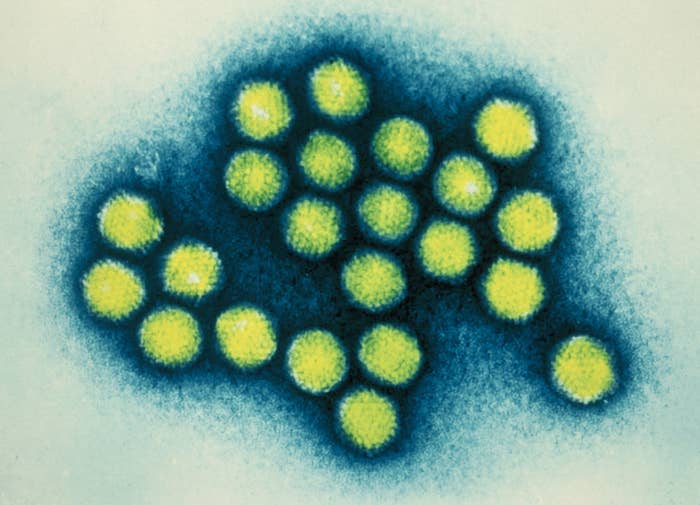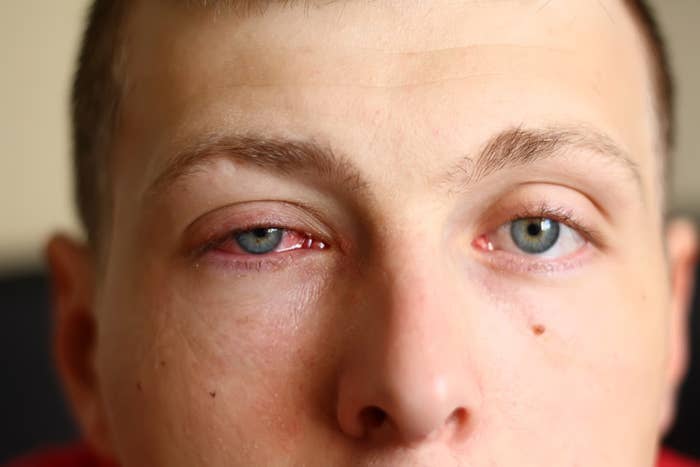
Earlier this month, a University of Maryland student named Olivia Paregol died after her persistent cough turned into life-threatening pneumonia. That same week, an eleventh child died in an ongoing outbreak among "medically fragile" children at a nursing and rehabilitation center in New Jersey.
The culprit? Adenovirus — a highly contagious virus that can cause everything from the mildest cold to a deadly respiratory infection. It's a very common virus, but unlike the flu, you've probably never heard of it before.
Adenoviruses are a group of viruses that can cause common colds, sore throats, bronchitis, pneumonia, conjunctivitis (pink eye), diarrhea, bladder infections, and more. In rare cases, adenovirus can affect the brain and spinal cord, causing neurologic disease.
Adenoviruses circulate year-round, but peak during the winter and early spring months. Most of the time, these infections are mild and go away on their own. "Unfortunately, there are a bunch of different strains and some are more virulent than others," Dr. Lisa Maragakis, senior director of infection prevention at the Johns Hopkins Health System in Baltimore, told BuzzFeed News.
In addition to Paregol, eight other adenovirus infections have been confirmed in University of Maryland students, a UMD health center spokesperson told BuzzFeed News. The CDC identified the strain in one of those cases as adenovirus type 7, the same strain that caused 11 deaths in children at the Wanaque Center for Nursing and Rehabilitation in Haskell, New Jersey.
Adenovirus type 7 is known to cause outbreaks of serious respiratory illness, according to the CDC. Other strains can lead to outbreaks of epidemic keratoconjunctivitis, an aggressive form of pink eye that causes fevers, Maragakis said.

"Depending on the type of adenovirus a person acquires and also on their own immune system, instead of getting the common cold they get a much more severe illness like pneumonia," said Maragakis, who did not treat any patients mentioned in this article.
While adenoviruses are usually not dangerous, they can quickly become serious or deadly for people with compromised immune systems. These include young babies, the elderly, people with underlying chronic illnesses, and people taking immunosuppressant drugs, Maragakis explained.
The children in the New Jersey outbreak were immunocompromised and some required ventilators for breathing assistance before they got sick with adenovirus. Paregol had Crohn's disease — an inflammatory bowel disease caused by an abnormal immune reaction — and was taking medication that weakened her immune system, her father, Ian Paregol, told the Baltimore Sun.
The Paregol family did not immediately respond to a request for comment from BuzzFeed News.
Adenovirus symptoms can mimic those of the flu and other cold-causing viruses, so the infection can be hard to diagnose, especially in the early stages. Testing usually involves swabbing the back of the nose and throat and using laboratory testing methods to detect adenovirus antigens, Maragakis said. Further testing to determine the specific strain of adenovirus is typically done at a state health department or the CDC, if necessary.

There is no specific treatment for adenovirus, but most infections are mild and go away on their own. Getting plenty of rest and fluids and taking over-the-counter medicine can ease symptoms. Adenovirus is a viral infection, so antibiotics are useless because these drugs can only treat bacterial infections.
In more severe adenovirus infections in which a person is hospitalized, treatment would depend on the symptoms and which organs are affected. According to Maragakis, the antiviral drug Cidofovir is sometimes used to treat severe adenovirus infections in immunocompromised patients.
It’s important for people with weakened immune systems or chronic illnesses to seek medical attention as soon as possible after developing cold or flu-like symptoms. Adenovirus can progress rapidly in these individuals, Maragakis said. However, adenovirus-related deaths are much less common than deaths from, say, the flu and its complications.
Health care providers and parents caring for children with weak immune systems should take extra steps to prevent the spread of illness.
The University of Maryland has been working with the local and state health departments to track cases of adenovirus and "redoubling cleaning efforts in high-touch areas to tackle the spread of viruses," university spokesperson Katie Lawson said in a statement.
According to the Baltimore Sun, Ian Paregol expressed concern that mold in his daughter's dorm may have exacerbated his daughter's illness. "The [CDC] says that no link exists between mold and adenovirus," Lawson wrote.

Adenoviruses are spread through direct personal contact with an infected person, inhaling respiratory droplets in the air produced when an infected person coughs or sneezes, and touching an object or surface that’s contaminated and putting your unwashed hands in your mouth or eyes.
Less commonly, adenoviruses can spread through an infected person's feces or through water in swimming pools. People can also “shed” adenovirus even after they have recovered and no longer show symptoms, according to the CDC.
Outbreaks tend to occur among people living in close quarters, such as military barracks, dorms, or hospitals, Maragakis said.
Washing your hands frequently with soap and water, avoiding touching your face, covering coughs and sneezes, and avoiding contact with sick people can help prevent the spread of adenovirus and other respiratory viruses, Maragakis said. There is no vaccine to prevent adenovirus, but you can still help protect people with weak immune systems by getting your seasonal flu vaccine.
